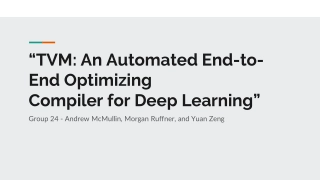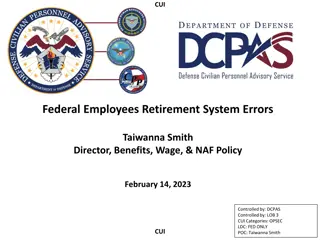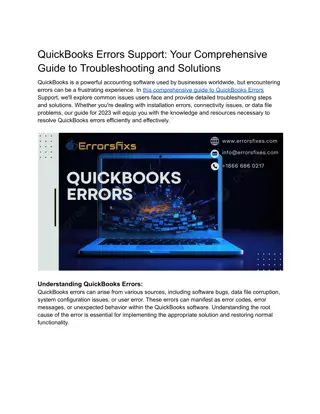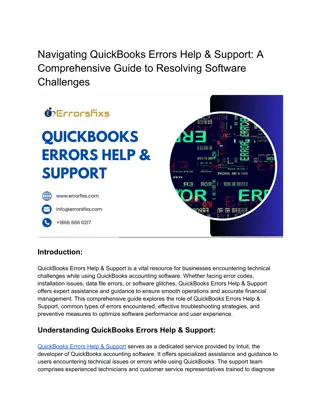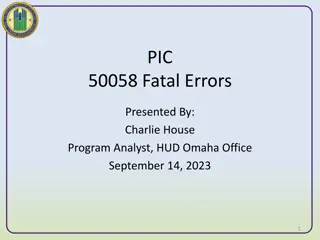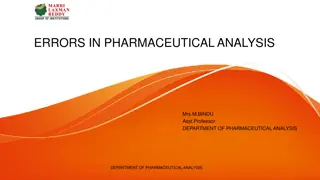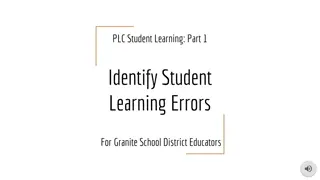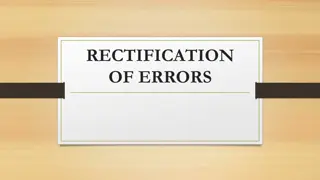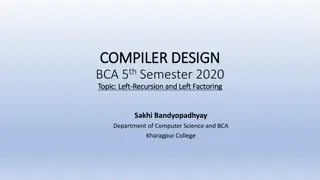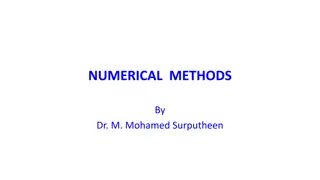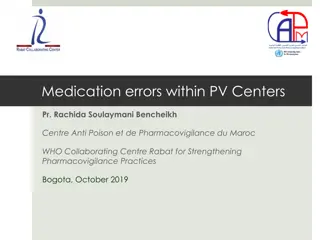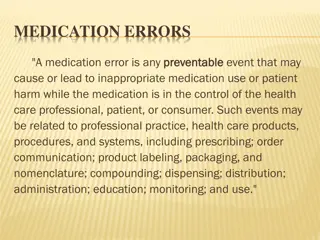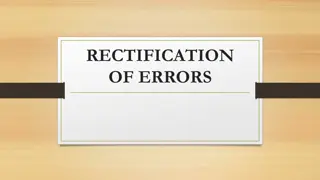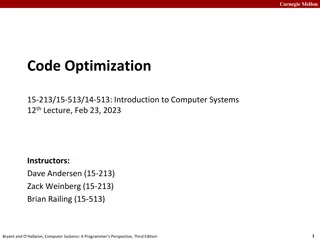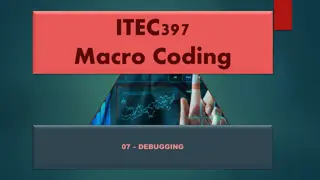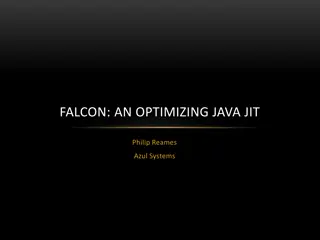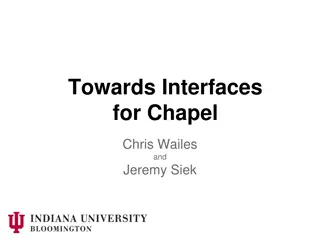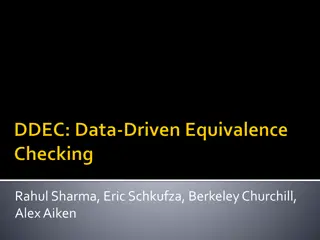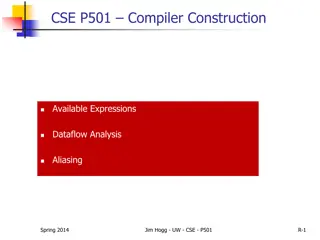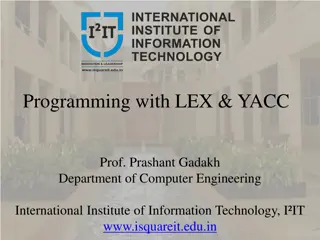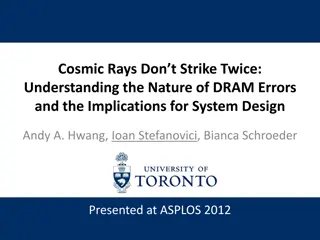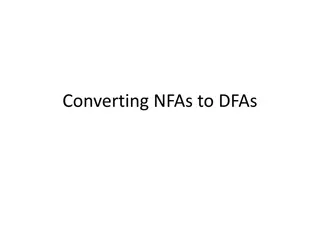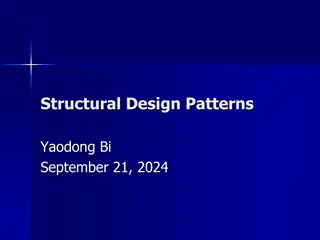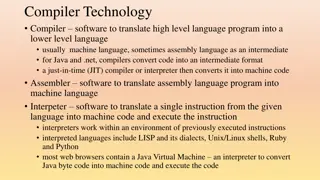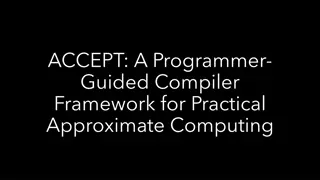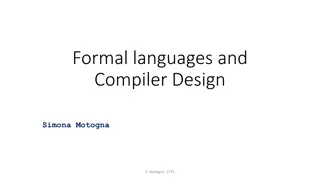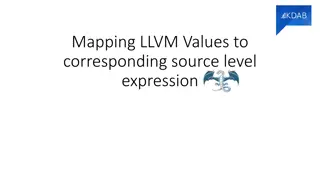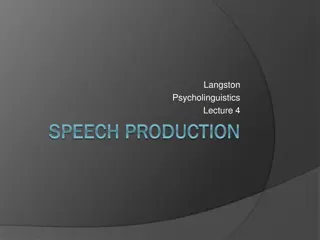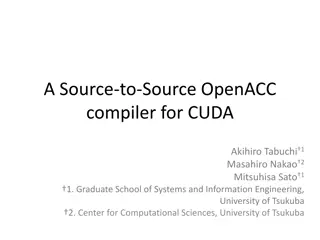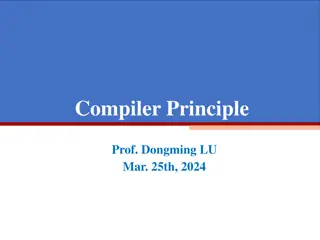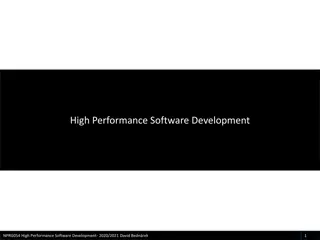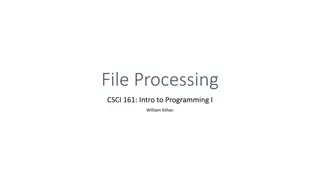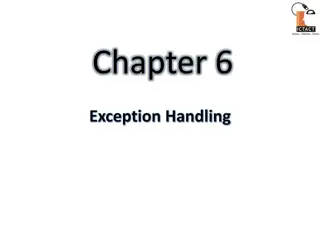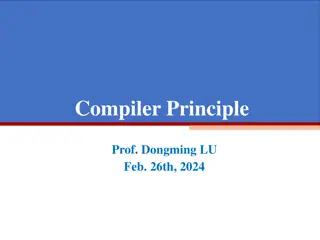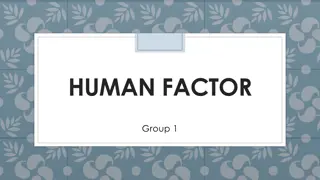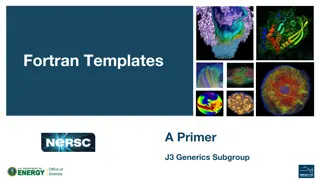TVM: An Automated End-to-End Optimizing Compiler for Deep Learning
TVM is a compiler that generates optimized code for diverse hardware back-ends from high-level specifications of deep learning programs, addressing the challenges of diverse hardware characteristics.
5 views • 16 slides
Federal Employees Retirement System Errors Overview
Federal Employees Retirement System (FERS) encompasses various retirement plans with different contribution rates for federal employees. Recent discoveries of coding errors have led to a department-wide review to identify and rectify potential errors affecting thousands of employees. The errors rang
0 views • 14 slides
Understanding Errors in Quality Control Training
Explore the difference between systematic and random errors in labs, focusing on accuracy and precision. Learn about types of systematic errors such as shifts and trends, their causes, and how they affect the reliability of test systems. Discover the impact of random errors on precision and variabil
2 views • 13 slides
QuickBooks Errors Support
Navigating QuickBooks errors can be daunting, but with our expert support, you can conquer any challenge. Our comprehensive guide offers step-by-step solutions to resolve common QuickBooks errors efficiently, ensuring uninterrupted access to your financial data. Whether you're facing unrecoverable e
2 views • 3 slides
Navigating QuickBooks Errors Help & Support_ A Comprehensive Guide to Resolving Software Challenges
If you're experiencing any issues with QuickBooks, we're here to help. Our team of experts offers comprehensive support services to help you resolve any errors you may encounter, from common installation or update problems to more complex issues that can affect data integrity. With years of experien
8 views • 4 slides
Importance of Correcting PIC Errors in HUD Form 50058 Submissions
Submission errors in HUD Form 50058 to PIC can lead to various consequences, including the need for corrections within a specific timeframe, monitoring PHA performance, analyzing programs, and preventing fraud. Timely identification and correction of errors are crucial to avoid complications and ens
0 views • 19 slides
Understanding Errors in Pharmaceutical Analysis
This article explores different types of errors in pharmaceutical analysis, such as determinate and indeterminate errors, and discusses their impact on analysis results. It also covers the concepts of accuracy, precision, and minimizing systematic errors in analytical chemistry. The importance of id
1 views • 37 slides
Identifying Student Learning Errors and Mistakes in Education
When examining student work, it's crucial to consider individual learning styles to differentiate between learning errors and simple mistakes. Identifying these errors helps determine students' progress accurately. Additionally, understanding the root cause, whether behavioral or emotional, is essen
1 views • 14 slides
Understanding Exceptions in Computer Science
Errors in programming, such as syntax, semantic, runtime, and logical errors, can disrupt the execution of a program. Syntax errors relate to grammatical violations, semantic errors occur when statements lack meaning, and runtime errors happen during program execution due to illegal operations. By i
1 views • 35 slides
Understanding Rectification of Errors in Accounting
Preparation of trial balance is essential for verifying the accuracy of accounting records, but it is not a conclusive proof of correctness. Rectification of errors is crucial for ensuring the true and fair presentation of a business's financial position. Types of errors include errors of omission,
0 views • 14 slides
Understanding Left Recursion and Left Factoring in Compiler Design
Left recursion and left factoring are key concepts in compiler design to optimize parsing. Left recursion can be problematic for top-down parsers and needs to be eliminated using specific techniques. Left factoring is a method to resolve ambiguity in grammars with common prefixes, making them suitab
0 views • 15 slides
Understanding Numerical Methods and Errors in Computation
Delve into the world of numerical methods through the guidance of Dr. M. Mohamed Surputheen. Explore topics such as solving algebraic and transcendental equations, simultaneous linear algebraic equations, interpolation, numerical integration, and solving ordinary differential equations. Learn about
0 views • 130 slides
Understanding Medication Errors in Pharmacovigilance Centers
Adverse drug reactions resulting from medication errors are a significant concern faced by pharmacovigilance centers. This content discusses the importance of this problem, contributing factors, the relevance to pharmacovigilance centers, and strategies for managing medication errors. It highlights
4 views • 29 slides
Understanding Medication Errors in Healthcare
Medication errors are preventable mistakes in medication use that can lead to patient harm. Factors contributing to these errors include human-related, system-related, and medication-related issues. Human-related factors involve providers and patients being overworked, under-trained, or distracted,
0 views • 13 slides
Understanding and Rectifying Accounting Errors
Preparation of a trial balance helps in checking the accuracy of recording and posting transactions, but it may not always guarantee error-free records. Rectification of errors is essential to present a true financial picture. Types of errors include omission, commission, principle, and compensating
0 views • 14 slides
Evolution of Compiler Optimization Techniques at Carnegie Mellon
Explore the rich history of compiler optimization techniques at Carnegie Mellon University, from the early days of machine code programming to the development of high-level languages like FORTRAN. Learn about key figures such as Grace Hopper, John Backus, and Fran Allen who revolutionized the field
0 views • 49 slides
Understanding Debugging in Programming
Debugging is a crucial aspect of programming to identify and fix errors that can cause program failures, hangs, or unexpected results. There are different types of errors such as compile errors, runtime errors, and logic errors, each requiring a different approach to resolve. Learning about the mode
0 views • 20 slides
Solving Misprints: A Problem of Undetected Errors
Two proof-readers are checking a manuscript but find different numbers of errors. When only the errors they both find are compared, it reveals a specific pattern. This challenge prompts an exploration of the likelihood of undetected errors and how to approach similar problems by setting specific int
2 views • 25 slides
Falcon: An Optimizing Java JIT Compiler Overview
Explore Falcon, an LLVM-based just-in-time compiler for Java bytecode developed by Azul Systems. Learn why using LLVM to build a JIT compiler is beneficial, address common objections, and dive into the technical and process lessons learned through its development timeline.
0 views • 66 slides
Enhancing Chapel Compiler with Interfaces and Semantic Changes
Explore the evolution of Chapel compiler with the integration of interfaces, semantic modifications, and improvements in error messages. Delve into the concepts of constrained generics, function call hijacking prevention, and the impact on compiler efficiency.
0 views • 30 slides
Grammar Errors Correction Exercises for English Language Learners
Correcting grammatical errors is essential for students learning English. This content provides exercises where students need to identify and correct errors in given sentences. The errors include punctuation mistakes, subject-verb agreement, possessive forms, and spelling errors. By practicing these
0 views • 23 slides
Ensuring Equivalence in Compiler Optimization Programs
Explore the challenges of proving equivalence in compiler optimization programs, validate refactorings, and analyze the trustworthiness of compilers through binary equivalence testing. Learn about handling loops, utilizing decision procedures, and running tests to confirm program behavior.
0 views • 24 slides
Dataflow Analysis for Available Expressions in Compiler Construction
Utilizing dataflow analysis techniques, the concept of available expressions is discussed in the context of compiler construction. The goal is to identify common subexpressions that span basic blocks by calculating their availability at the beginning of each block. The process involves determining w
0 views • 59 slides
Introduction to Lex and Yacc: Compiler Design Essentials
Lex and Yacc are essential tools in compiler design. Lex serves as a lexical analyzer, converting source code to tokens, while Yacc is a parser generator that implements parsing based on BNF grammars. Through these tools, strings are processed, and code is generated for efficient compilation. This i
0 views • 10 slides
Understanding DRAM Errors: Implications for System Design
Exploring the nature of DRAM errors, this study delves into the causes, types, and implications for system design. From soft errors caused by cosmic rays to hard errors due to permanent hardware issues, the research examines error protection mechanisms and open questions surrounding DRAM errors. Pre
0 views • 31 slides
Compiler Data Structures and NFA to DFA Conversion
Compiler data structures play a crucial role in the compilation process, handling lexical analysis to code generation. Understanding the conversion from non-deterministic finite automata (NFA) to deterministic finite automata (DFA) is essential for efficient language processing and optimization.
0 views • 10 slides
Understanding Façade Design Pattern in Structural Design Patterns
Façade design pattern simplifies the interface of a complex system by providing a unified and straightforward interface for clients to access the system's functionalities. It helps in isolating the clients from the complexities of underlying components, offering a more user-friendly experience. The
0 views • 48 slides
Overview of Compiler Technology and Related Terminology
Compiler technology involves software that translates high-level language programs into lower-level languages, such as machine or assembly language. It also covers decompilers, assemblers, interpreters, linkers, loaders, language rewriters, and preprocessing steps used in compilation. Understanding
0 views • 29 slides
ACCEPT: A Programmer-Guided Compiler Framework for Practical Approximate Computing
ACCEPT is an Approximate C Compiler framework that allows programmers to designate which parts of the code can be approximated for energy and performance trade-offs. It automatically determines the best approximation parameters, identifies safe approximation areas, and can utilize FPGA for hardware
0 views • 15 slides
Formal Languages and Compiler Design by Simona Motogna - Overview
This content provides an in-depth look into the course "Formal Languages and Compiler Design" by Simona Motogna. Covering topics such as compiler design, organization issues, history of programming languages, structure of a compiler, scanning techniques, and more. It also delves into the components
0 views • 18 slides
Understanding Compiler Optimizations in LLVM: Challenges and Solutions
Compiler optimizations in LLVM, such as loop vectorization, are crucial for enhancing program performance. However, understanding and addressing optimization challenges, like backward dependencies, can be complex. This article explores how LLVM values map to corresponding source-level expressions an
0 views • 41 slides
Insights into Speech Production: Models, Errors, and Implications
Explore the intricacies of speech production through the lens of models, errors, and their impact on speech perception. Understand common types of errors in speech production, such as shifts, exchanges, anticipation, perseveration, additions, deletions, substitutions, and blends. Discover how errors
0 views • 38 slides
OpenACC Compiler for CUDA: A Source-to-Source Implementation
An open-source OpenACC compiler designed for NVIDIA GPUs using a source-to-source approach allows for detailed machine-specific optimizations through the mature CUDA compiler. The compiler targets C as the language and leverages the CUDA API, facilitating the generation of executable files.
0 views • 28 slides
Overview of Compiler Principle - Prof. Dongming LU
Introduction to compiler principles with a focus on lexical analysis, parsing, abstract syntax, semantic analysis, activation records, translating into intermediate code, and other key aspects related to bindings in the Tiger compiler. The content covers topics like semantic analysis, name spaces, t
0 views • 21 slides
High Performance Software Development - Topics and Related Lectures
This course on High Performance Software Development covers various topics such as modern programming styles, CPU properties, performance tuning, compiler optimization, memory hierarchy, and more. It also emphasizes the importance of using vector instructions within C/C++ for parallel programming. T
0 views • 10 slides
Understanding File Processing and Input/Output Operations in Java
Gain insights into file processing and I/O operations in Java programming, covering topics such as file handling, reading files, file paths, compiler errors, exceptions, and the 'throws' clause. Learn how to work with files, handle errors effectively, and optimize your code for efficient file manage
0 views • 41 slides
Exception Handling in Java: Understanding Errors and Exceptions
Exception handling in Java is crucial for dealing with errors and exceptions that can occur during program execution. Errors and exceptions are conditions that disrupt the normal flow of a program, and understanding their differences is key to effective error management. This chapter covers the conc
0 views • 32 slides
Compiler Principle by Prof. Dongming LU: Overview and Phases
Compiler Principle course explores the translation of programming languages into executable code using techniques, data structures, and algorithms. The course covers modules, interfaces, and phases of a typical compiler, emphasizing the importance of abstract syntax and intermediate code. Key concep
0 views • 37 slides
Understanding Human Factors in Medical Errors
In a video discussing medical errors, it was highlighted that 100,000 to 200,000 people die annually due to medical errors in the USA. Causes were attributed to system failures, not just healthcare provider errors. Examples included a surgeon removing a healthy kidney instead of a diseased one and a
0 views • 13 slides
Understanding Fortran Templates and Compiler-Driven Design Goals
Delve into the world of Fortran templates through a primer on generics, showcasing design goals set by the compiler. Explore syntax examples and motivating examples such as the AXPY subroutine, offering insight into the self-consistent nature of templates and their flexibility in parameter combinati
0 views • 9 slides
